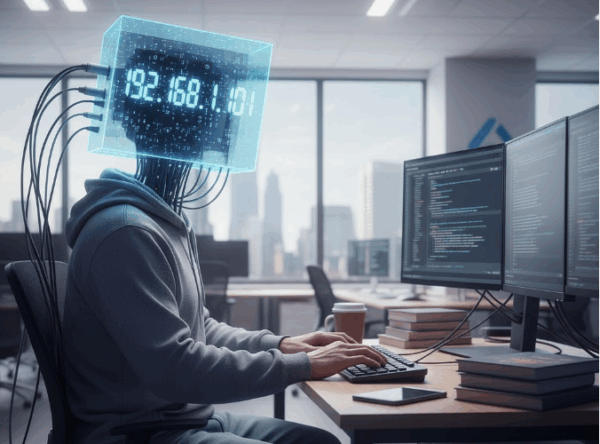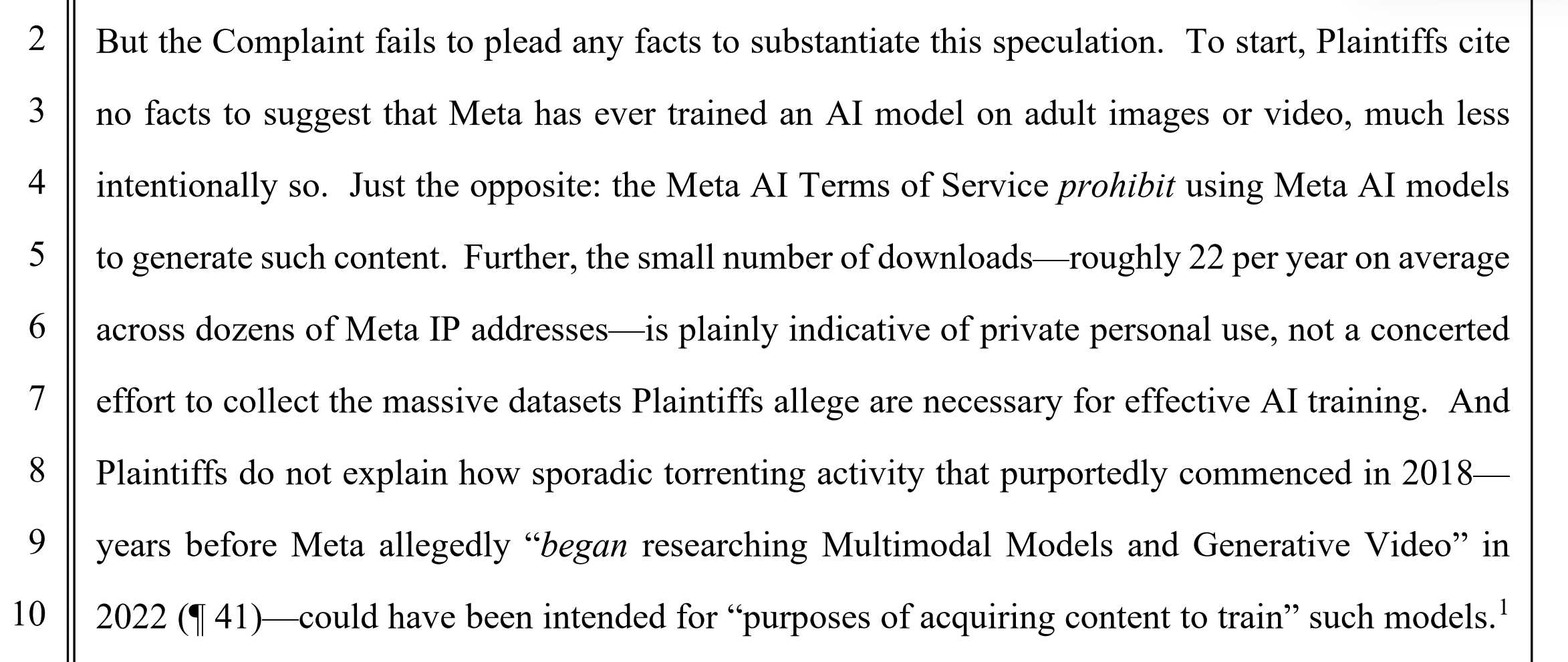 Over the past two years, rightsholders of all kinds have filed lawsuits against companies that develop AI models.
Over the past two years, rightsholders of all kinds have filed lawsuits against companies that develop AI models.
With billions in potential damages at stake, these cases have also drawn the interest of Strike 3 Holdings.
As the most prolific copyright litigant in the United States, the adult film producer has filed tens of thousands of lawsuits against alleged BitTorrent pirates. This summer it expanded its scope by taking aim at Meta.
2,396 Movies, $359 Million in Damages
Strike 3 Holdings and Counterlife Media, which are known for popular adult brands including Vixen, Tushy, Blacked, and Deeper, filed a copyright infringement complaint at a California federal court. The companies allege that Meta downloaded at least 2,396 of their films since 2018, allegedly to aid their AI video training.
The adult producers discovered the alleged infringements after Meta’s BitTorrent activity was revealed in a lawsuit filed by several book authors. In that case, Meta admitted that it obtained content from pirate sources.
This prompted Strike 3 and Counterlife Media to search for Meta-linked IP addresses in their archive of collected BitTorrent data. This scan revealed that forty-seven IP addresses, identified as owned by Facebook, allegedly infringed their copyrighted works.
If Meta is indeed found liable for these alleged infringements, the adult content producers could seek as much as $359 million in damages. However, this week the company returned fire, asking the court to dismiss what it describes as a ‘nonsensical’ complaint for various reasons.
Meta Hits Back at “Copyright Troll”
This week, Meta responded to the complaint by filing a motion to dismiss. The tech giant describes Strike 3 as a prolific copyright litigator that some have labeled a “copyright troll”. These lawsuits against alleged BitTorrent pirates also served as inspiration for one of Meta’s defenses.
Taking a page from the BitTorrent piracy defense playbook, Meta counters that the IP address evidence presented by the plaintiffs is meaningless without context. The Court of Appeals for the Ninth Circuit previously ruled that an IP address alone is not sufficient to prove who the ‘direct’ infringer is. Rightsholders need “something more“.
IP address is insufficient
According to Meta, there is no evidence that the alleged infringing activity on its corporate network is centrally orchestrated. This would be “nonsensical”, it counters, noting that Strike 3 already logged infringing activity in 2018, years before Meta started training its video models.
“Plaintiffs do not explain how sporadic torrenting activity that purportedly commenced in 2018— years before Meta allegedly ‘began researching Multimodal Models and Generative Video’ in 2022 could have been intended for ‘purposes of acquiring content to train’ such models,” Meta notes.
“Plaintiffs’ supposition that Meta must have instigated these downloads for AI training is implausible on its face. All Plaintiffs have are IP addresses, which is insufficient to state a claim.”
Likely for “Private Personal Use”
Meta clearly denies that the adult video downloads were used for AI purposes. Since there is no evidence that Meta directed this activity, it can’t be held liable for direct copyright infringement.
The tech company doesn’t just deny the allegations; it also offers an alternative explanation. Meta suggests that employees or visitors may have downloaded the pirated videos for personal use.
The personal use angle also makes sense considering that the download volume was rather small, especially for AI training purposes.
“[T]he small number of downloads—roughly 22 per year on average across dozens of Meta IP addresses—is plainly indicative of private personal use, not a concerted effort to collect the massive datasets Plaintiffs allege are necessary for effective AI training,” Meta writes.
Private personal use
The complaint also referenced thousands of IP addresses outside of Meta’s network that were allegedly used to conceal its BitTorrent activities. These addresses showed correlational activity, which the plaintiffs painted as more evidence of wrongdoing.
Meta, however, refutes this allegation, noting that the timing of this activity also points to personal use instead of an orchestrated scheme.
“And there is yet another conundrum Plaintiffs fail to address: why would Meta seek to ‘conceal[]’ certain alleged downloads of Plaintiffs’ and third-party content, but use easily traceable Meta corporate IP addresses for many hundreds of others, including 157 of Plaintiffs’ works?”
“The obvious answer is that it would not do so; Plaintiffs’ entire AI training theory is nonsensical and unsupported,” Meta concludes.
Contributory or Vicarious Infringement?
Meta does not rule out that its network was used to download the pirated adult videos. However, the company again cites jurisprudence from other BitTorrent piracy lawsuits, to argue that it is not secondarily liable for this activity.
The rightsholders’ vicarious copyright infringement claim fails, Meta argues, because the company has no financial interest in these ‘personal use’ downloads. Nor was it required to supervise or intervene, as the Ninth Circuit ‘Cobbler’ case made clear.
Meta uses the same Cobbler precedent to counter the contributory infringement claim. This falls flat, as Meta says that it has no “knowledge” of the pirating activity, nor did it materially contribute to it.
All in all, Meta sees no reason why this case should go any further and asks the court to dismiss the complaint in full.
“[T]hese claims fail not only for lack of supporting facts, but also because Plaintiffs’ theory of liability makes no sense and cannot be reconciled with the facts they do plead. The entire complaint against Meta should be dismissed with prejudice,” Meta concludes.
Strike 3 Holdings and Counterlife Media have the opportunity to oppose the motion to dismiss within two weeks, after which Meta will be allowed to file a follow-up response. After that, the California federal court will decide whether this case moves forward, or if it ends here.
—
A copy of Meta’s motion to dismiss, submitted at the U.S. District Court of the Northern District of California, is available here (pdf).
.png)



